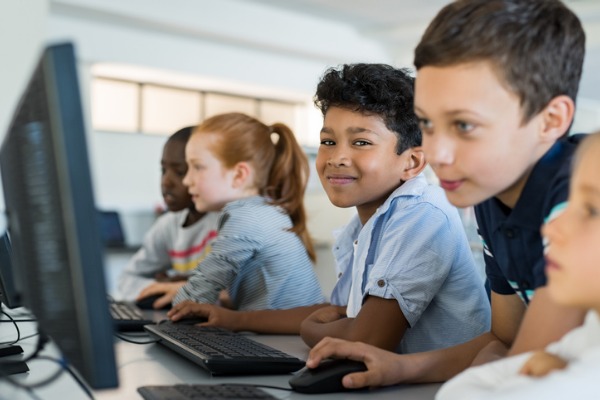
Age-Appropriate Screen Time Limitations for Teenagers
Information overload can lead to a loss of personal creativity, which typically happens in times of quiet, uninterrupted thought.
Around the time my husband and I had our first child, several close friends of ours had their first child too. As it turned out, some of our closer friends had boys and as time passed, we were oftentimes the only couple in the group with a baby girl. Comparatively speaking — and our friends would probably agree, our baby girl was relatively calm in her demeanor in comparison to the baby boys who were a bit more energetic… or playful. It all depends on how you look at it, really.
Now, I’m not sure where the scientific evidence lies on the differences between girls and boys at a very young age. However, as some of our friends are quick to point out, the tables are going to turn once our little girl reaches her teenage years. If you read between the lines, what they’re saying is that teenage boys are easier to deal with than teenage girls. Okay, well nobody really knows what the future holds. We’ll be prepared for a full plate in a little over ten years, but we’ll also enjoy the so-called advantages that we’re experiencing now.

The Rundown:
So while I’m on the topic of teenagers, poor screen-time habits can exacerbate whatever other problems you might be experiencing during this time. There are several eye health risks associated with excessive blue light exposure from smartphone overuse, which include: dry eye and the questionable progression of myopia. However, these eye health problems are secondary in comparison to larger issues that can stem from smartphone overuse.
In his article entitled: I’m an eye doctor. Here’s how to keep screens from ruining your vision, Philip Yuhas, OD states: “When it comes to protecting your vision and keeping your eyes healthy, blue light isn’t your biggest concern… based on my research, my advice is don’t believe the hype about blue light and don’t waste your money on products you don’t need.”
So what does this mean? In my opinion, Dr. Yuhas is playing down the eye health risks associated with excessive screen-time because the sun poses a much greater threat to our eyes. However, he is pointing out the overall health risks by explaining sleep disruptions as a result of excessive screen-time. He goes on to state “… screen time before bed increases the time it takes to fall asleep. It also robs you of restorative rapid-eye-movement sleep, dulls focus, and diminishes brain activity the next day. Holding your phone close to your eyes with the lights on likely exacerbates the problem.” Besides the loss of a good night’s sleep, other health risk associated with screen-time overuse (especially in teenagers) include:
- Depression, anxiety, and/or boredom
- Loss of imagination
- Distraction
Let’s face it, constantly checking social media feeds can lead to a depressed state and we’re seeing more and more evidence that constantly checking news feeds can lead to anxiety. On top of that, a constant state of stimulation can lead to boredom without the dopamine hit that comes with constantly reaching for your smartphone.
As far as teenagers are concerned, information overload can lead to a loss of personal creativity, which typically happens in times of quiet, uninterrupted thought. Furthermore, the right amount of focus is extremely important for schoolwork, athletics, and extra-curricular activities. Every time a smartphone rings or buzzes it distracts from sustained focus.
Finding Answers:
Establish boundaries in the home. When I look back at my own teenage years, it’s easy to see how fragile those years actually were. If you come from a full-house like me, your parents were likely doing their best to stay in control while the children — especially the teenagers, struggled for attention in and out of the home. And we didn’t even have smartphones back then.
Needless to say, there are many more threats in today’s digital environment. That said, if parents aren’t careful, this struggle for attention can result in tensions that are unproductive and unwanted. A good idea is to establish a system of trust. Now, it may be hard for some parents to straddle the line between respect for privacy and authoritarian leadership — but in the end, a balanced approach is the best approach. Establishing parental boundaries might even lead your teen to go above and beyond to maintain a certain level of freedom.
Parents can start with some ground rules, or a contract so to speak. Start by telling your teen(s) they won’t be spied on. For example, you won’t eavesdrop on phone conversations, read text threads/emails, or even stalk their social media pages, if that’s what they want. For added effect, put it all in writing. In return, your teen should understand that you can demand their digital devices along with access to their accounts at any time (especially when you feel their safety is at stake). This reasonable contract encourages teens to make sound decisions — albeit a bit indirectly, while parents maintain the ability to protect their children. If this idea doesn’t seem reasonable, the letdown that can occur as a result of broken trust might be worse.
Encourage productive tech-time. By all means, not every aspect of screen-time is negative. In fact, there are many positive benefits to productive screen-time, some of which can be life-changing. In other words, if your teens tech interests can be funneled into productive pursuits, by all means encourage this.
In today’s day and age, digital literacy is in extremely high demand and the academic pursuit of technology related subjects is seemingly never-ending. That said, if your teen shows interest in programming, design, or even spreadsheets for that matter, there’s plenty to learn so an early start might be beneficial. On the contrary, even if your teen is a technological wizard, parents should still watch out for the warning signs of excessive screen-time, which include:
- Replacing physical activities with more screen-time
- Lack of sleep due to late night screen-time
- Stifling real-time interactions (such as family dinners or road trips) with excessive screen-time
As with most parenting topics, open communication will play a major factor. Parents should also be ready to adjust any plan at a moments notice. Several factors will make the technological landscape unpredictable from year to year so parents should be ready to redraw the battle lines from time to time. The process of trial and error is very important as you aim for balance with your teen(s).
Aim for balance. At this point, it’s pretty safe to say that technology isn’t going anywhere. In fact, the world will likely become more technologically driven as time passes. Is this a good thing for our children, I’m not quite sure. However, it’s in our best interest to understand the challenge and stay flexible. There are many positives to staying digitally connected and streamlining processes that used to be inconvenient.
As is the case with most things in life, balance is the key. It might be difficult, but it’s important to establish a balanced relationship with tech early and often. A balanced relationship with tech may look a lot like balanced nutritional and fitness habits. For instance, it’s better to stick to a healthy diet as opposed to eating junk food all day. It’s also better to move around as opposed to playing video games for long hours. There’s no one idea that works better than another, but you know balance when you experience it.
Dr. Maria Pribis is the founder of OcularPrime and the mother of a one and a half year old daughter. She hopes to remember that she wrote this article by the time her daughter reaches her teenage years.







